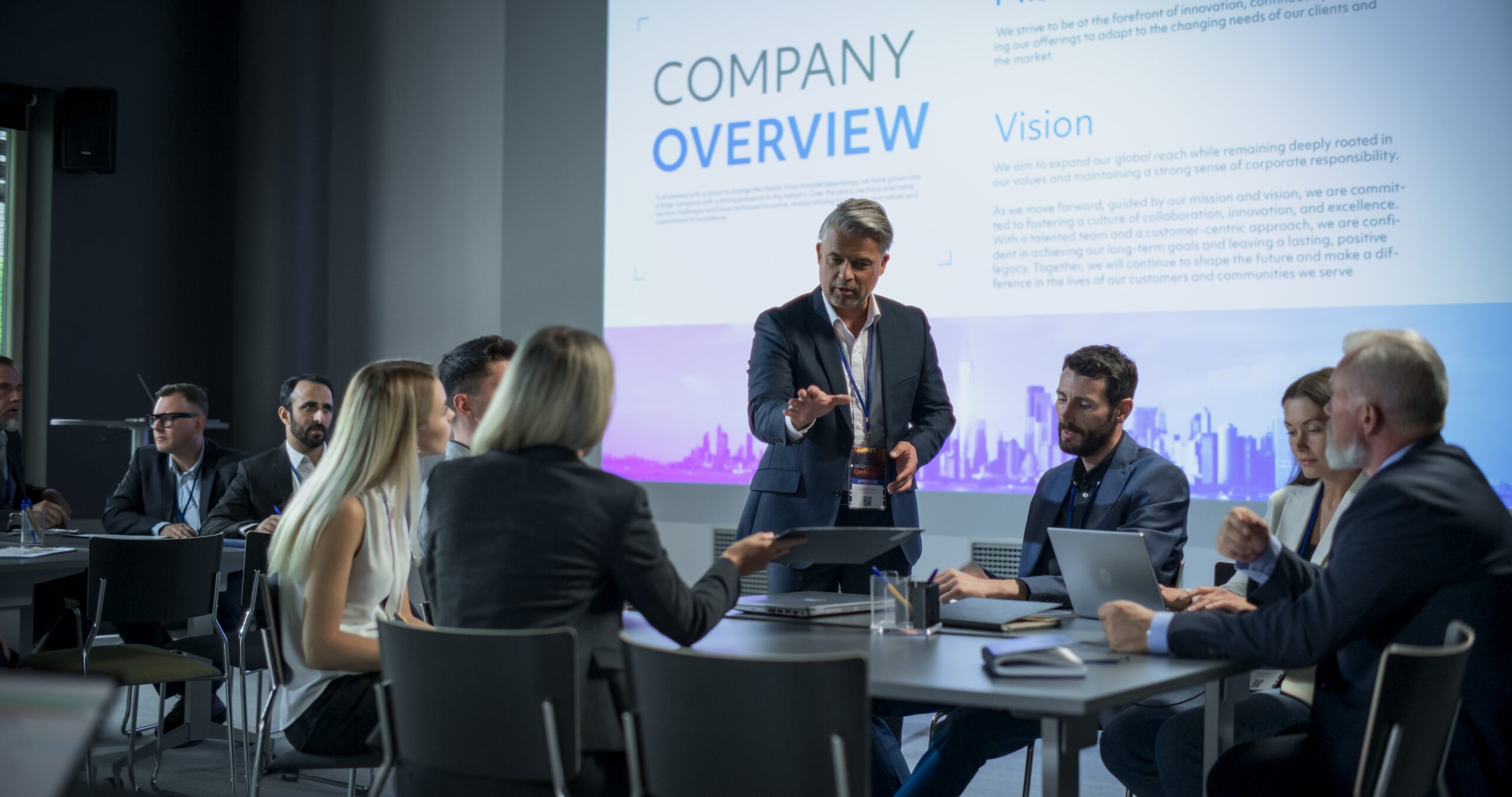Make the most of your mentoring partnership with a clear, shared agenda for every meeting. This guide outlines six suggested meeting templates over a six-month period—helping mentors and mentees build rapport, set goals, overcome challenges, and reflect on progress together.
Continue readingMember spotlight with Daniel Merriott CPMgr CMgr FIML
In this Member Spotlight, we speak with Daniel Merriott CPMgr CMgr FIML, Managing Director of Digital Skills Agency New Zealand. Daniel shares insights from his leadership journey, the importance of lifelong learning, and the digital capabilities leaders will need to thrive in 2026.
Continue readingBeyond stress and burnout: how empathy is the next frontier of wellbeing
As burnout continues to rise across Australian workplaces, empathy is emerging as the key to sustainable wellbeing. This article explores how empathetic leadership transforms wellbeing from a reactive initiative into a proactive, human-first practice — fostering psychological safety, trust, and connection in modern organisations.
Continue readingDon’t lead blind: build resilience with experienced advisers
Discover how trusted advisers can transform leadership resilience. Drawing parallels to Sherpas guiding mountaineers, this article explores how Advisory Boards help CEOs build emotional, strategic, and decision-making resilience, boost productivity, and unlock growth opportunities.
Continue readingThe future of leadership training: trends every business should know
Leadership is no longer about holding a title. It’s about equipping people with the skills to inspire, adapt, and deliver results in a constantly shifting business environment. The future belongs to leaders who can balance technology with empathy, strategy with agility, and growth with responsibility. That’s why leadership training is now one of the most important investments businesses can make in their people.
At the Institute of Managers and Leaders (IML), leadership development has been at the heart of our work for over 80 years. Through accredited courses, professional memberships, and pathways such as the Certified Practising Manager (CPMgr), IML helps individuals and organisations build the leadership capability needed to thrive into the future.
In this article, we’ll explore the emerging trends that are reshaping leadership development, the skills leaders of tomorrow will need, and how organisations can select courses that deliver real impact. We’ll also answer some common questions about leadership training to help you plan with confidence.
Why are we seeing leadership training evolving?
The workplace of 2026 and beyond looks very different to the one a decade ago. Distributed teams, AI-driven workplaces, generational shifts, and the pressure for sustainable business models mean leaders are juggling more complexity than ever. McKinsey’s recent Learning Perspective 2025 found that over 70% of executives believe their leadership models must change to keep pace with digital transformation, yet fewer than 30% feel fully ready to lead in AI-enabled environments.
Likewise, Harvard Business Publishing’s 2024 Global Leadership Development Study reports that more than half of organisations (52%) indicate scalability and sustainment of leadership courses are their top challenge.
From an Australian perspective, data from the Australian Bureau of Statistics shows that 23% of Australians aged 15-74 had undertaken work-related training in the past 12 months.
These figures underscore that while businesses recognise the need for leadership training, many are scrambling to adapt and scale courses that truly meet future challenges.
Discover how IML’s Foundations of Intentional Leadership equips leaders to adapt to emerging challenges with agility, confidence, and purpose.
Five key trends every business should watch.
1. Digital-first leadership
The digital revolution has reshaped how leaders make decisions, communicate, and plan for the future. As AI and analytics become part of daily operations, leaders must not only understand the tools but also apply them responsibly. This shift has been accelerated by rapid advances in generative AI and the expectation that leaders make faster, data-driven decisions.
McKinsey found that companies in the top quintile for digital and AI maturity deliver 2–6 times higher shareholder returns than their peers, showing how digital readiness translates directly into business performance (McKinsey, 2023).
IML’s leadership courses emphasise building digital awareness within ethical and human frameworks, helping managers lead confidently in an AI-enabled world.
2. Human skills at the centre
While technology is vital, it has highlighted the irreplaceable value of human skills such as empathy, communication, and emotional intelligence. In hybrid and remote workplaces, leaders are under pressure to keep teams engaged and connected. The growth of wellbeing initiatives and demand for psychologically safe workplaces also puts soft skills at the centre of leadership development.
Research shows that 90% of top performers have high emotional intelligence, while teams led by leaders with strong EQ experience significantly lower turnover and higher engagement (HBR, 2024).
Empower your team’s success with IML’s New Manager Course, focused on developing the essential human skills that define great leaders – communication, empathy, and people leadership.
3. Inclusive and global mindsets
Diversity and inclusion are no longer optional. They are tied to innovation, retention, and brand reputation. As workforces span multiple cultures and geographies, leaders need cultural agility and inclusive practices to build teams that thrive. This trend is also driven by employee expectations; younger generations want to work for organisations that value equity and fairness.
Deloitte’s 2024 Human Capital Trends report found that 74% of organisations now view DEI as a critical driver of business performance, not just a compliance exercise (Deloitte, 2024).
Through pathways such as the Certified Practising Manager (CPMgr) accreditation, IML recognises leaders who champion ethical, inclusive, and values-driven practices, with a strong focus on purpose and sustainability as core pillars of modern leadership.
4. Continuous learning models
Leadership is not a skill you master once. It requires constant evolution. Organisations are moving away from one-off courses and toward modular, flexible, and ongoing learning through micro-modules, mentoring, and peer coaching. The growth of remote work and fast-changing business needs have accelerated this trend, as leaders must stay current without leaving their roles for extended periods.
Harvard Business Publishing’s 2024 study reports that 52% of organisations struggle to scale leadership courses, and many are shifting toward continuous, personalised models to sustain value (Harvard, 2024).
Explore IML’s Foundations of Intentional Leadership to create a continuous learning culture that builds capability at every level of your organisation.
5. Purpose and sustainability in modern leadership
Leaders today must balance growth with responsibility – driving performance while addressing environmental and social impact. Customers, employees, and investors increasingly hold organisations accountable for ethical and sustainable practices, making purpose-driven leadership an essential skill.
IML’s Foundations of Intentional Leadership course helps leaders navigate this complexity with clarity and confidence. Through modules on ethical decision-making, values-based leadership, and purpose alignment, this course equips managers to embed sustainability and social responsibility into everyday practice.
Research by McKinsey shows that organisations with strong ESG performance achieve 10–20% higher employee satisfaction and attract more investors, proving that purpose-led leadership delivers both social and financial value.
Skills future leaders will need
Well-designed leadership training equips people with a blend of strategic and interpersonal strengths that are increasingly in demand.
- Agility in decision-making
Responding quickly to disruption without losing sight of long-term goals. - Tech-enabled leadership
Understanding digital tools and data to drive smarter strategies. - Collaboration and motivation
Building engaged, high-performing teams in hybrid and remote contexts. - Change navigation
Leading through uncertainty with resilience and vision. - Personal development
Building self-awareness, authenticity, and confidence to lead effectively.
Help your team prepare for the future with IML’s leadership pathways, designed to nurture these skills through accredited, practical learning experiences.
These skills help professionals prepare for bigger responsibilities while enabling organisations to grow with stability and foresight.
Frequently Asked Questions
How does leadership training adapt to emerging technologies like AI?
Many modern courses now include modules on digital fluency and AI literacy, helping leaders understand how to integrate new technologies into decision-making and team workflows. IML’s Foundations of Intentional Leadership course gives participants practical strategies to lead confidently in technology-driven workplaces.
What role does mentoring play in leadership development?
Mentoring is becoming a core feature of leadership training, offering participants real-world guidance from experienced professionals. This blend of structured learning and practical advice accelerates growth and builds confidence. IML integrates mentoring into its courses and membership courses to provide lasting development support.
Can leadership training improve organisational culture?
Yes. Well-designed courses don’t just develop individual skills; they also promote behaviours that shape culture such as accountability, inclusivity, and collaboration. IML’s courses are built to align people development with organisational culture goals.
How do businesses measure the success of leadership training?
Organisations increasingly use performance metrics like employee engagement scores, retention rates, and project outcomes to track the ROI of training. Beyond numbers, improved morale and stronger collaboration are key indicators of success.
What industries are likely to see the fastest evolution in leadership needs?
Sectors experiencing rapid disruption such as technology, healthcare, and sustainability-focused industries will require leaders who can adapt quickly. Leadership training in these fields is shifting to emphasise agility, ethics, and resilience.
What are the signs your leadership training is outdated?
If your courses still focus mostly on hierarchical command, one-size-fits-all curricula, or purely face-to-face delivery, they’re likely behind. Emerging expectations demand digital fluency, hybrid delivery, and training that evolves with technology and cultural change.
How can small or mid-sized businesses get leadership training that competes with large firms?
Smaller businesses can use blended formats, microlearning, peer mentoring, or partner with providers such as IML, whose scalable and accredited courses make high-quality leadership development accessible and impactful.
What metrics should businesses track to evaluate leadership training success?
Beyond participant satisfaction, look at business outcomes: employee retention, promotion rates, team performance metrics, cultural indicators (e.g., inclusion, engagement), and innovation measures. Also, track how much training is applied on job vs. theoretical knowledge.
Shape the future of leadership in your organisation
The future of leadership is intentional, inclusive, and adaptive. With over 80 years of experience, IML continues to guide professionals and organisations toward impactful, ethical, and high-performing leadership through courses, membership benefits, and nationally recognised accreditation pathways.
Get your team ready for 2026 – explore IML’s leadership pathways.
References
- Harvard Business Publishing. (2024). 2024 Global Leadership Development Study: Time to Transform. Retrieved from https://www.harvardbusiness.org/wp-content/uploads/2024/06/CRE5057_CL_TT24_Research-Findings_June24.pdf
- McKinsey & Company. (2025). Learning Perspective 2025. McKinsey’s Research & Innovation Learning Lab. Retrieved from https://www.mckinsey.com/~/media/mckinsey/featured%20insights/people%20in%20progress%20blog/learning%20trends%202025/2025_mckinsey%20learning%20perspective.pdf
- Australian Bureau of Statistics. (2021). Work-Related Training and Adult Learning, Australia, 2020–21. Retrieved from https://www.abs.gov.au/statistics/people/education/work-related-training-and-adult-learning-australia/latest-release
The quiet cracking crisis all leaders should be aware of
Dr Michelle McQuaid explores the hidden workplace crisis of “quiet cracking” and what leaders can do to spot the signs and prevent burnout.
Continue readingMember spotlight with Hayley O’Brien
Urban planner and CPMgr Hayley shares how people-focused leadership, strategic project delivery, and professional accreditation have shaped her journey, offering practical insights for emerging leaders to create meaningful impact in their teams and communities.
Continue readingWhat the best leaders do differently
Connected leadership goes beyond communication – it’s about creating genuine connection, inspiring purpose, and leading as a whole human. In this article, Tim Jack Adams shares what the best leaders do differently, from building trust and resilience to igniting cultures where people thrive sustainably, together.
Continue readingThe 5 difficult conversations leaders need to know how to have
Mastering difficult conversations at work requires empathy, open questions, and emotional intelligence. Discover five practical steps to handle tough discussions with confidence.
Continue reading










